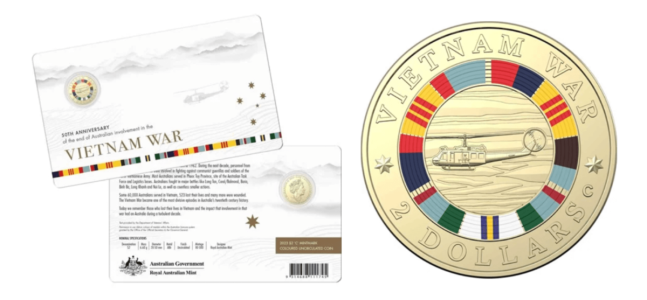Vietnamese government demands a halt to Australian coins featuring the former regime's flag
- Replies 11
Vietnam's Communist Government has demanded that Australia stop producing commemorative coins that depict the flag of South Vietnam, which was once US-supported and overthrown in 1975.
To mark the 50th anniversary of Australian troops withdrawing from southern Vietnam, the Royal Australian Mint issued 85,000 sets of gold and silver $2 coins in April.
The flag of South Vietnam, yellow with three red stripes, was depicted on the coins, but it was banned by the Vietnamese government.
Vietnam's Ministry of Foreign Affairs deputy spokeswoman, Pham Thu Hang, expressed disappointment and disapproval on behalf of the Vietnamese government on Thursday. She stated that the Vietnamese government had communicated with the Australian government regarding the matter and requested a halt to the coins' circulation.
Furthermore, she stated that it is 'completely inconsistent with the good development trend [of those efforts]' after the two countries flagged their intention to elevate their bilateral relationship to a comprehensive strategic partnership during National Assembly Chairman Vuong Dinh Hue's visit to Canberra last November.

The Royal Australian Mint has come forward to defend the commemorative coins that are at the centre of the diplomatic dispute with Vietnam. On Friday, the Mint stated that the design of the coins was based on the colours of the ribbons of the service medals awarded to Australians who served in the Vietnam War.
'The Australian Government does not recognise the flag of the former Republic of Vietnam,' the Mint added in a statement to AFP.
The Department of Foreign Affairs and Trade (DFAT) also issued a statement in defence of the coins and the accompanying stamp. According to the DFAT spokesperson, the coins and stamps were created to honour Australians who served in Vietnam.
'The design of the coin and stamp reflects the colours of the ribbons of the service medals awarded to these personnel, including the Vietnam medal, introduced in 1968,' the spokesperson said.
Furthermore, the spokesperson reiterated that the Australian government 'does not recognise' the yellow flag of the former Republic of Vietnam.
The Vietnam War remains a sensitive topic in Australian history, with over 60,000 soldiers serving in the conflict, 523 losing their lives, and almost 2,400 being injured, according to Australia's War Memorial website.
As many of you are well aware, the war was Australia's longest involvement in a 20th-century conflict and became deeply unpopular, with thousands of people marching against Australia's role in the early 1970s. The withdrawal of Australian troops from Vietnam in 1973, two years before the fall of Saigon and the Communist takeover, marked the end of the country's direct military involvement in the conflict.
The commemorative coins issued by the Royal Australian Mint were intended to honour the sacrifice and service of Australian soldiers in Vietnam.
Despite the diplomatic tensions, the Australian government maintains that the coins and accompanying stamps are a tribute to the Australian soldiers who served in the Vietnam War, rather than a political statement or endorsement of the former South Vietnamese government.

The dispute raises important questions about the role of commemorative items in shaping public memory and how different interpretations of historical events can create tensions between nations.
What responsibility, if any, do governments have to consider the potential political implications of their commemorative designs? Is it possible to separate the commemoration of soldiers' service from political and ideological agendas? And what can we learn from this controversy about how different nations remember and interpret their histories?
As the diplomatic dispute continues to unfold, it is clear that the commemoration of past events remains a complex and contested issue that requires careful consideration and sensitivity.
What are your thoughts on this issue, members? Let us know in the comments below.
To mark the 50th anniversary of Australian troops withdrawing from southern Vietnam, the Royal Australian Mint issued 85,000 sets of gold and silver $2 coins in April.
The flag of South Vietnam, yellow with three red stripes, was depicted on the coins, but it was banned by the Vietnamese government.
Vietnam's Ministry of Foreign Affairs deputy spokeswoman, Pham Thu Hang, expressed disappointment and disapproval on behalf of the Vietnamese government on Thursday. She stated that the Vietnamese government had communicated with the Australian government regarding the matter and requested a halt to the coins' circulation.
Furthermore, she stated that it is 'completely inconsistent with the good development trend [of those efforts]' after the two countries flagged their intention to elevate their bilateral relationship to a comprehensive strategic partnership during National Assembly Chairman Vuong Dinh Hue's visit to Canberra last November.

Vietnam's government has called on Australia to halt issuing commemorative coins depicting the flag of the former US-supported southern regime. Credit: Perth Mint.
The Royal Australian Mint has come forward to defend the commemorative coins that are at the centre of the diplomatic dispute with Vietnam. On Friday, the Mint stated that the design of the coins was based on the colours of the ribbons of the service medals awarded to Australians who served in the Vietnam War.
'The Australian Government does not recognise the flag of the former Republic of Vietnam,' the Mint added in a statement to AFP.
The Department of Foreign Affairs and Trade (DFAT) also issued a statement in defence of the coins and the accompanying stamp. According to the DFAT spokesperson, the coins and stamps were created to honour Australians who served in Vietnam.
'The design of the coin and stamp reflects the colours of the ribbons of the service medals awarded to these personnel, including the Vietnam medal, introduced in 1968,' the spokesperson said.
Furthermore, the spokesperson reiterated that the Australian government 'does not recognise' the yellow flag of the former Republic of Vietnam.
The Vietnam War remains a sensitive topic in Australian history, with over 60,000 soldiers serving in the conflict, 523 losing their lives, and almost 2,400 being injured, according to Australia's War Memorial website.
As many of you are well aware, the war was Australia's longest involvement in a 20th-century conflict and became deeply unpopular, with thousands of people marching against Australia's role in the early 1970s. The withdrawal of Australian troops from Vietnam in 1973, two years before the fall of Saigon and the Communist takeover, marked the end of the country's direct military involvement in the conflict.
The commemorative coins issued by the Royal Australian Mint were intended to honour the sacrifice and service of Australian soldiers in Vietnam.
Despite the diplomatic tensions, the Australian government maintains that the coins and accompanying stamps are a tribute to the Australian soldiers who served in the Vietnam War, rather than a political statement or endorsement of the former South Vietnamese government.
Key Takeaways
- Vietnam's government has demanded that Australia cease issuing commemorative coins that depict the flag of the former US-backed South Vietnam.
- The Royal Australian Mint has defended the coins, stating that they were designed to honour the service and sacrifice of Australian soldiers who served in the Vietnam War.
- Despite the ongoing diplomatic dispute, the Australian government has maintained that the coins and accompanying stamps were not intended as a political statement.
The dispute raises important questions about the role of commemorative items in shaping public memory and how different interpretations of historical events can create tensions between nations.
What responsibility, if any, do governments have to consider the potential political implications of their commemorative designs? Is it possible to separate the commemoration of soldiers' service from political and ideological agendas? And what can we learn from this controversy about how different nations remember and interpret their histories?
As the diplomatic dispute continues to unfold, it is clear that the commemoration of past events remains a complex and contested issue that requires careful consideration and sensitivity.
What are your thoughts on this issue, members? Let us know in the comments below.








